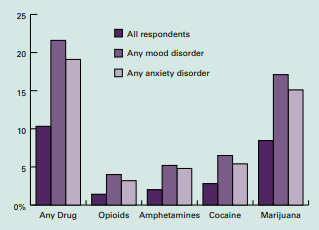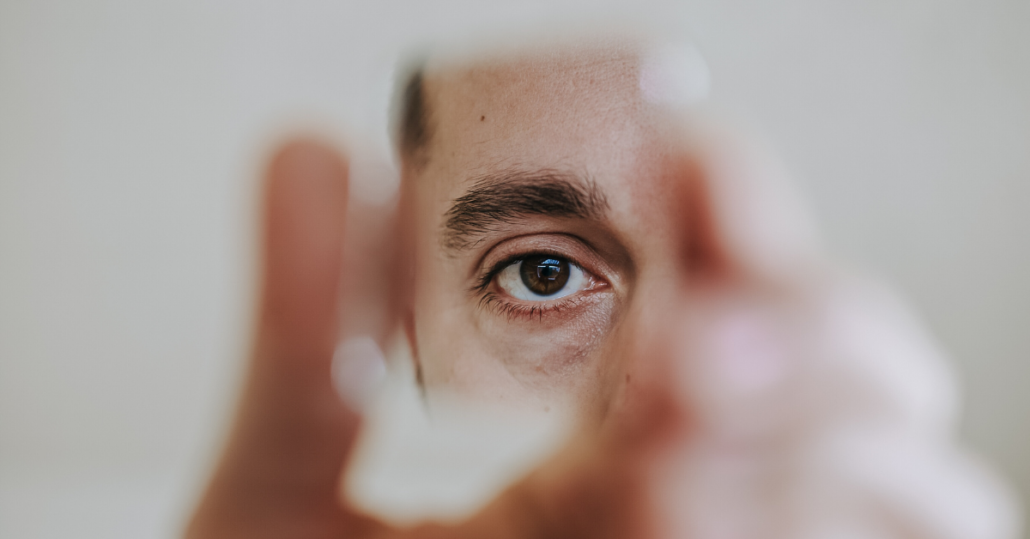What are Mood and Personality Disorders?
Sometimes it is difficult to tell the difference between mental health conditions—especially with a mood disorder and personality disorder. To tell the difference between the two, we need to identify the pattern of symptoms they cause. Mood and Personality Disorder treatments are most effective with a combination of therapy and medication. However, the specific types of treatment that work best will depend on the individual. Talking with a mental health professional about your condition is the first step of getting the appropriate mood and personality disorder treatment.
In 2017, 24.1% of people with a personality disorder also had a mood disorder. [1] This happens because the instability of self-image or relationships—which is common for people with personality disorders—can trigger depression. In fact, this can also increase the risk of substance abuse, which is another depression trigger.

Get Your Life Back
Find Hope & Recovery. Get Safe Comfortable Detox, Addiction Rehab & Mental Health Dual Diagnosis High-Quality Care at the We Level Up Treatment Centers Network.
Hotline (877) 378-4154What are Mood Disorders?
Mood disorders cause emotional highs or lows that last for days, weeks, or for a longer period. Your emotions are more intense than normal when you have this mental illness. Many factors contribute to mood disorders. They are likely caused by an imbalance of brain chemicals. Life events (such as stressful life changes) may also contribute to a depressed mood. Moreover, mood disorders also tend to run in families.

Causes of Mood Disorder
The exact cause of many mood disorders is unknown at this time. Factors that may contribute to the development of mood disorder:
- Brain Chemicals. Also known as called neurotransmitters. They regulate moods, feelings and behavior. It is thought that changes in the levels of these neurotransmitters can lead to mood disorders.
- Genetics. It appears that heredity may contribute to mood disorders,
- Trauma. Stress or major life changes in the case of depression.
Types of Mood Disorders
- Depression: Depression is the most common mood disorder. It is characterized by feelings of hopelessness and worthlessness over at least two weeks. Depression can be triggered by life events such as losing a job or a loved one.
- Bipolar Disorder: Individuals experience periods of depression and mania with this disorder. Manic episodes may include symptoms like having high energy, reduced need for sleep, and loss of touch with reality. During the depressive episodes, you may have low energy, loss of interest in daily activities, and low motivation. Mood episodes last days to months and may also be associated with suicidal thoughts.
- Dysthymia: This is a chronic, low-grade, depressed, or irritable mood that lasts for at least 2 years.
- Mood Disorder related to another health condition: Many medical illnesses (including cancer, injuries, infections, and chronic illnesses) can trigger symptoms of depression.
- Substance-Induced Mood Disorder: Symptoms of depression that are because of medicine, drug abuse, alcoholism, exposure to toxins, or other forms of treatment. [2]
Symptoms of Mood Disorder
According to The Johns Hopkins University, the following are the most common symptoms of a mood disorder:
- Ongoing sad, anxious, or “empty” mood
- Feeling hopeless or helpless
- Having low self-esteem
- Feeling inadequate or worthless
- Excessive guilt
- Repeating thoughts of death or suicide, wishing to die, or attempting suicide (Note: People with this symptom should get mood and personality disorder treatment right away!)
- Loss of interest in usual activities or activities that were once enjoyed, including sex
- Relationship problems
- Trouble sleeping or sleeping too much
- Changes in appetite and/or weight
- Decreased energy
- Trouble concentrating
- A decrease in the ability to make decisions
- Frequent physical complaints (for example, headache, stomachache, or tiredness) that do not get better with treatment
- Running away or threats of running away from home
- Extremely sensitive to failure or rejection
- Irritability, hostility, or aggression
Get Help. Get Better. Get Your Life Back.
Searching for Accredited Drug & Alcohol Rehab Centers Near You? Or Mental Health Support?
Even if you have failed previously, relapsed, or are in a difficult crisis, we stand ready to support you. Our trusted behavioral health specialists will not give up on you. Call us when you feel ready or want someone to speak to about therapy alternatives to change your life. Even if we cannot assist you, we will lead you wherever you can get support. There is no obligation. Call our hotline today.
FREE Addiction Hotline – Call 24/7What are Personality Disorders?
It is generally thought that personality disorders are caused by events that occurred during childhood. These impactful events may include neglect, abuse, or abandonment. People with a personality disorder display more rigid thinking and reacting behaviors that make it hard for them to adapt to a situation. These behaviors often disrupt their personal, professional, and social lives. [3]

Causes of Personality Disorder
According to American Psychological Association [2], several factors may contribute to the development of personality disorders.
- Genetics – genes links to aggression, anxiety and fear
- Childhood trauma – link between the number and type of childhood traumas
- Verbal abuse – Children who had experienced such verbal abuse were three times as likely as other children to have personality disorders in adulthood.
- High reactivity – Sensitivity to light, noise, texture and other stimuli may also play a role.
- Peers – even a single strong
Common Types of Personality Disorders
According to Johns Hopkins Medicines, personality disorders are divided into 3 subtypes (or clusters), and include the following:
- For odd/eccentric: Cluster
- For dramatic/erratic: Cluster B
- And, for anxious/inhibited: Cluster C
Examples of odd/eccentric (Cluster A) personality disorders
- Paranoid personality disorder – If you are diagnosed with this disorder, you may also suffer from paranoia. Paranoia is an unrelenting mistrust and suspicion of others, even when there is no reason to be suspicious.
- Schizoid personality disorder – It is an uncommon condition in which people avoid social activities and consistently shy away from interaction with others. You may also have a limited range of emotional expression with this disorder.
- Schizotypal personality disorder – It can cause you to have disordered thinking, perception, and ineffective communication skills. Many symptoms of schizotypal personality disorder look like schizophrenia but are less intense and intrusive.
Examples of dramatic/erratic (Cluster B) personality disorders
- Borderline personality disorder – This disorder impacts the way you think and feel about yourself and other. It includes self-image issues, difficulty managing emotions and behavior, and a pattern of unstable relationships.
- Antisocial personality disorder – Those with antisocial personality disorder tend to lie, break laws, act impulsively and lack regard for their own safety or the safety of others.
- Narcissistic personality disorder – People with this disorder present severely overly-inflated feelings of self-worth, grandness, and superiority over others. They are overly sensitive to criticism, judgment, and defeat.
- Histrionic personality disorder – It is defined by the American Psychiatric Association as a personality disorder characterized by a pattern of excessive attention-seeking behaviors.
Examples of anxious/inhibited (Cluster C) personality disorders
- Dependent personality disorder – You rely heavily on others for validation and fulfillment of basic needs. You cannot properly care for yourself. People with dependent personality disorder lack self-confidence and security.
- Avoidant personality disorder – You are overly sensitive to rejection. Because of this, you avoid situations with any possible conflict. This reaction is fear-driven. With this disorder, you become disturbed by your own social isolation, withdrawal, and inability to form close, interpersonal relationships.
- Obsessive-compulsive personality disorder – It is a mental illness that causes repeated unwanted thoughts or sensations (obsessions) or the urge to do something repeatedly (compulsions).
Mood Disorders vs. Personality Disorders
The most frequently confused disorders are bipolar disorder and borderline personality disorder/BDP. The reason is that both disorders lead to erratic and impulsive behavior. A bipolar person’s behavior can look a lot like the behavior of someone with BPD during a manic episode. And then, BPD also has a high risk of depression, which can look very much like the depressive episodes of someone with bipolar disorder.
Having a personality disorder can trigger a mood disorder, but the reverse situation does not happen. The foundation for a personality disorder is laid during childhood as it is during these years that a person’s personality is formed. On the other hand, the main feature of mood disorders is periods of emotional highs and/or lows.
Personality disorders can cause mood swings, but this is not the main symptom of personality disorders. Individuals are often diagnosed with depression, but their doctor does not realize that their depression was a symptom of an underlying personality disorder. For this reason, a patient cannot receive sufficient treatment without a complete diagnosis.

Comfortable Facilities & Amenities
High-Quality Addiction & Mental Health Rehabilitation Treatment
Rehab Centers TourRenowned Addiction Centers. Serene Private Facilities. Inpatient rehab programs vary.
Addiction Helpline (877) 378-4154Proven recovery success experience, backed by a Team w/ History of:
15+
Years of Unified Experience
100s
5-Star Reviews Across Our Centers
10K
Recovery Success Stories Across Our Network
- Low Patient to Therapist Ratio
- Onsite Medical Detox Center
- Comprehensive Dual-Diagnosis Treatment
- Complimentary Family & Alumni Programs
- Coaching, Recovery & Personal Development Events
Mood and Personality Disorder Treatment
The first step to mood and personality disorder treatment is an accurate diagnosis. And, whether it is a mood disorder or a personality disorder, getting the proper and complete diagnosis is extremely important.
Treatment for Mood Disorders
Mood disorders treatment may include:
- Antidepressant and mood-stabilizing medicines – Medications have shown to work very well in the treatment of depression when combined with psychotherapy.
- Psychotherapy – Most often cognitive-behavioral and/or interpersonal therapy. During psychotherapy, you learn about your condition and your moods, feelings, thoughts, and behaviors. It also helps to improve interpersonal relationship skills and identifying stressors in the environment and how to avoid them
- Family Therapy – Families play a vital supportive role in any treatment process.
- And, other therapies, such as Electroconvulsive Therapy and Transcranial Stimulation.
Treatment for Personality Disorders
Psychological and medical treatment is often helpful to keep the symptoms of personality disorders at bay. Your healthcare provider will determine the treatment for your specific personality disorder based on:
- Your age
- Overall health
- Medical history
Treatment may include:
- Medicine – Medicine works most effectively in combination with psychotherapy. You also need to be incredibly careful when taking medicines, to never take them incorrectly.
- Psychological treatment – Including family involvement for a more successful treatment.
Psychotherapy
Psychotherapy is the primary form of mood and personality disorder treatment. A therapist can provide one-on-one treatment between the therapist and client or treatment in a group setting. Therapist-led group sessions may help teach people with borderline personality disorder how to interact with others and how to effectively express themselves.
It is important that people in therapy get along with and trust their therapist. Unfortunately, the very nature of borderline personality disorder can make it difficult for people with the condition to maintain a comfortable and trusting bond with their therapist.
Two examples of psychotherapies used to treat borderline personality disorder include:
- Dialectical Behavior Therapy (DBT): This type of therapy was developed for individuals with mood and personality disorder. DBT uses concepts of mindfulness and acceptance or being aware of and attentive to the current situation and emotional state. DBT also teaches skills that can help:
- Control intense emotions
- Reduce self-destructive behaviors
- Improve relationships
- Cognitive Behavioral Therapy (CBT): This type of therapy can help people with borderline personality disorder identify and change core beliefs and behaviors that underlie inaccurate perceptions of themselves and others, and problems interacting with others. CBT may help reduce a range of mood and anxiety symptoms and reduce the number of suicidal or self-harming behaviors.
World-class, Accredited, 5-Star Reviewed, Effective Addiction & Mental Health Programs. Complete Behavioral Health Inpatient Rehab, Detox plus Co-occuring Disorders Therapy.
CALL (877) 378-4154End the Addiction Pain. End the Emotional Rollercoaster. Get Your Life Back. Start Drug, Alcohol & Dual Diagnosis Mental Health Treatment Now. Get Free No-obligation Guidance by Substance Abuse Specialists Who Understand Addiction & Mental Health Recovery & Know How to Help.
Medications for Mood and Personality Disorder Treatment
Because the benefits are unclear, medications are not typically used as the primary treatment for borderline personality disorder. However, in some cases, a psychiatrist may recommend medications to treat specific symptoms such as:
- Mood swings
- Depression
- Other co-occurring mental disorders
Treatment with medications may require care from more than one medical professional.
Certain medications can cause different side effects in different people. Talk to your doctor about what to expect from a particular medication. These steps can all be part of a co-occurring integrated Mood and Personality Disorder Treatment modality.
Dual Diagnosis for Mood and Personality Disorder Treatment
Comorbidity of personality disorders and substance use disorders is common in clinical practice. The review of the National Institute of Mental Health suggests that the overall prevalence of personality disorder ranges from 10% to 14.8% in the normal population and from 34.8% to 73.0% in patients treated for addictions. Even though the types of personality disorder seen in patients with drug and alcohol use disorder are similar, the prevalence of any personality disorder is higher among patients with drug use disorder than alcohol use disorder. [4].
While there is some overlap between the symptoms of these two conditions, they each have particular aspects and require different treatment methods. Our extensive experience allows us to cater our Mood and Personality Disorder treatment specific to each client’s need.
40-60% of adults with a severe and persistent mental health disorder experienced drug & alcohol addiction. For this reason, We Level Up NJ Dual Diagnosis treatment center has developed a dual therapy program track. Providing a runway for more successful evidence-based modalities for clients suffering from co-existing disorders. Our treatment center is an accredited mood and personality disorder treatment center.
Each component of these integrated programs is distinct, with diverse capabilities, and accommodates patients with various conditions from all over the USA. Mood disorders are treatable. With the right treatment, about 80% of people experience significant symptom relief. Our extensive list of Mood and Personality Disorder treatment programs has many methods specific to mood disorders and specific to you!

At the We Level Up NJ treatment center, we provide world-class care with round-the-clock medical professionals available to help you cope. All working as a team providing primary SUD treatment along with primary substance abuse and co-occurring secondary Mood and Personality Disorders treatment for successful recovery. Make this your opportunity to reclaim your life. Call today to speak with one of our treatment specialists. Our counselors know what you are going through and will answer any of your questions. Your call is private and confidential and there is never any obligation.
Experience Transformative Recovery at the We Level Up Treatment Center.
See our authentic success stories. Get inspired. Get the help you deserve.



Start a New Life
Begin with a free call to an addiction & behavioral health treatment advisor. Learn more about our dual-diagnosis programs. The We Level Up treatment center network delivers various recovery programs at each treatment facility. Call to learn more.
- Personalized Care
- Caring Accountable Staff
- Comfortable Amenities
- Licensed & Accredited
- Renowned w/ 5-Star Reviews
We’ll Call You
Sources:
[1] NCBI – https://www.nimh.nih.gov/health/statistics/personality-disorders
[2] Mood Disorders – https://www.hopkinsmedicine.org/health/conditions-and-diseases/mood-disorders#:~:text=The%20most%20common%20types%20of%20mood%20disorders%20are%20major%20depression,clear%20cause%20of%20mood%20disorders.
[3] Personality Disorders -https://www.hopkinsmedicine.org/health/conditions-and-diseases/personality-disorders
[4] NCBI– https://www.ncbi.nlm.nih.gov/pmc/articles/PMC6241194/
